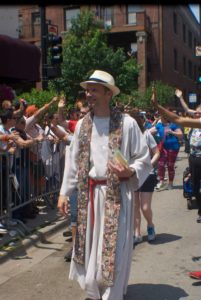
In honor of Pride Week here in Chicago, this week’s post is an excerpt from my book about our church’s experience with the Pride Parade:
Every year on the last Sunday of June, an estimated one million people line the streets in Chicago’s Uptown, Lakeview, and Lincoln Park neighborhoods to cheer for the parade’s numerous LGBTQ-affirming groups and floats. We’re proud to walk with numerous faith groups in the parade, and we always try to be particularly bold (another of our core values) when we do so by handing out small flyers that proclaim God loves all and, truth be told, also give some information about our church.
I’ll never forget the first year we walked. We handed out hundreds of flyers along the parade route, and I thought for sure this would be a great way to publicize Urban Village. I couldn’t wait for the next Sunday to arrive, because I just knew many people would see our flyers and flock to our church. I wondered: Should we print more bulletins to be ready? Recruit extra greeters? The day arrived and we flung open the doors to . . . about the same number of people that had already been coming. The same thing happened the Sunday after that one and the Sunday after that one. There was no bump in attendance and, on the bulletin slips that we encourage visitors to fill out, no one said they came because of the parade. I kind of considered that initial Pride Parade evangelism effort a waste of time and money. Thankfully, my mind has drastically changed.
We’ve now walked in the parade for six straight years, and I’m sure we’ve handed out at least 10,000 flyers. In all that time, we’ve maybe had ten people attend an Urban Village event or worship because of a flyer. And that may be generous. If you look at the rate of return (one-tenth of one percent), it would be a failure by any standard of measurement.
So why do we keep integrating this kind of failure into our evangelism plan every year? We discovered an unexpected benefit, and you can see it in the pictures of UVCers who walk every year. We had about a dozen people walk that first year, and now more than one hundred do. Participation has increased not just because we’ve grown, but because word has spread about the personal impact the parade has on those who walk. You can see it in their faces and hear it in their stories. Here’s one from Eric:
I moved to Chicago three years ago. I came to this city as a twenty-eight-year-old Christian and a three-year-old out gay man. I had found friction in my recent experiences out of the closet as I tried to marry the two sides of myself: a gay man and a Christian man. Marching in this parade made me uncomfortable. It put a spotlight on this tear inside myself. It pushed my boundaries and encouraged me, once again, to come out of the closet; this time, it was the Christian closet. Passing out flyers about Urban Village to bystanders was odd. Each time I did so, I was letting people know that I was a Christian. There is something remarkable about coming out of such closets. Taking this leap of faith, no matter how large or how small clarifies the relationship you have with witnesses of your “coming out” experience. With these tiny interactions on the Halsted Street side of “Boystown,” my UVC flyers were accepted with warmth and invitation. “Yes, you are gay. Yes, you are a Christian. Yes, I accept your flyer. Yes, you are welcome here.”
I compare the impact it has on the walkers to the reaction of the seventy who were sent out by Jesus. In Luke 10:1-12, Jesus appoints “seventy others” to go ahead of him to every town and place and bring peace, cure the sick, and proclaim that the kingdom of God is near. They do so, and verse 17 records their excitement: “The seventy returned with joy, saying, ‘Lord, in your name even the demons submit to us!’” The text doesn’t tell us if the seventy initially went out with excitement and joy. Maybe some of them were pumped up, but I have to believe that some of them went a little grudgingly, not because they didn’t believe in what Jesus came to do, but because this may have been taking them way out of their comfort zone. After actually participating, however, their hearts and minds were changed.
